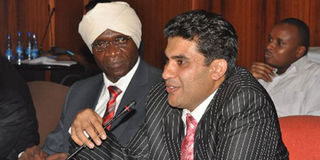Fresh scandals unearthed in health scheme

Photo|FILE
Clinix Healthcare Ltd Chief Executive officer Toddy Madahana (left) and chairman Jayesh Saini before the Parliamentary Committee investigating the NHIF scandal on May 15, 2012.
What you need to know:
- Board says payment to ghost clinics and irregular choice of facilities rampant
More irregularities have emerged in the award of tenders for a Sh634 million civil servants medical aid scheme.
The irregularities include payment to ghost clinics, unprocedural selection of clinics and creation of an unapproved unit at the National Hospital Insurance Fund to run the scheme.
A report by the fund’s caretaker board that was suspended by the High Court on Thursday established that accreditation of many service providers violated the law.
The interim report, handed over to Head of Public Service Francis Kimemia, accuses the fund’s management led by chief executive Richard Kerich of keeping the board in the dark.
“The board, which is mandated to approve all accredited facilities, was kept in the dark by the management,” says the report.
The Board Interim Progress Report also rules that the controversial Clinix was given blanket approval as a company in serving civil servants.
The standard procedure, according to the board, is that service providers are inspected and approved as stand-alones and not “under the cover of a company”.
The argument is that one facility in a chain of healthcare providers located in Nairobi, for example, could be suitable to offer a service while a similar one in Mombasa can be ill-equipped to do so.
Some of the board’s findings mirror those of the Parliamentary committee on Health, which were recently rejected by Parliament.
Based on this rejection, Medical Services Minister Anyang’ Nyong’o reinstated Mr Kerich but Director of Public Prosecutions Keriako Tobiko overruled him, saying investigations into graft claims were in progress.
In its key findings, the board faulted the implementation of the scheme, saying it became a preserve of a special department, the Strategic Business Unit, created by Mr Kerich.
“This unit hijacked the process and did not involve general managers,” the report said.
The team, appointed on May 9, said the medical scheme was conducted too quickly without proper planning.
The team visited clinics and found that some had poor management and communication structures and inadequate ICT support, among many other weaknesses.
“Having carefully studied what in the first instance went wrong, the board systematically moved to consult stakeholders, to open new facilities and to sever links with service providers who apparently abused the system,” the team reports.
Contrary to Prof Nyong’o’s claims that there was no proof of corruption, the team notes that investigations were still going on.
The board said it was helping the Ethics and Anti-Corruption Commission, Efficiency Monitoring Unit, Kenya National Audit Office and the Criminal Investigations Department in the investigations.
The board said it had stopped payments to healthcare providers under investigation — Clinix Healthcare Ltd and Meridian Health Centres.
It had also started inspecting and approving a new list of health facilities.
In addition to the NHIF accredited institutions, the board approved an additional 235 centres for gazettement.
A list of 628 has been published and members asked to make their choices.
The board resolved to engage Cotu and the Federation of Kenya Employers to accept the scheme and increased contribution from members.
Already, the reports said, the Kenya Association of Private Hospitals had agreed to work with NHIF in implementing the outpatient scheme.




